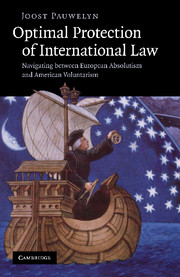 Optimal Protection of International Law
Optimal Protection of International Law Book contents
- Frontmatter
- Contents
- Table of cases
- Table of treaties
- Table of international documents
- Acknowledgments
- Abbreviations
- Foreword
- Introduction
- 1 Overview and relevance of the analysis
- 2 The two extremes of European absolutism and American voluntarism
- 3 Allocation, protection and back-up enforcement of entitlements
- 4 How should international law entitlements be protected?
- 5 How are international law entitlements currently protected?
- 6 Back-up enforcement in international law
- 7 Conclusion
- References
- Index
Introduction
Published online by Cambridge University Press: 07 July 2009
- Frontmatter
- Contents
- Table of cases
- Table of treaties
- Table of international documents
- Acknowledgments
- Abbreviations
- Foreword
- Introduction
- 1 Overview and relevance of the analysis
- 2 The two extremes of European absolutism and American voluntarism
- 3 Allocation, protection and back-up enforcement of entitlements
- 4 How should international law entitlements be protected?
- 5 How are international law entitlements currently protected?
- 6 Back-up enforcement in international law
- 7 Conclusion
- References
- Index
Summary
International law scholarship has long been obsessed with trying to explain and predict why and when states comply with international law. Is it because of pure self-interest, reputation, or domestic pressure groups and internalization, or perhaps explained by a sense of legal obligation or the legitimacy of the norm itself, or rather due to bureaucratic networks or the personal psychology of political leaders? This approach has consistently overlooked a logically preceding but no less important question: assuming, for a moment, that the necessary tools are available to induce or even force states to comply – whatever these tools may be, based on one's theory of compliance – how strongly should international law be protected? In other words, how strongly should states bind themselves to international law? I deliberately use the broader terms “protect” and “bind” as I want them to cover three distinct questions:
How easy should it be to create and change international law?
Must international law always be specifically performed or should states be given an opportunity to “pay their way out”?
In the event states do violate their commitments, what kind of back-up enforcement or sanctions should be imposed?
In recent decades, international law has come to address the full panoply of concerns of the regulatory state, ranging from individual human rights to the domestic regulation of commerce and the environment.
- Type
- Chapter
- Information
- Optimal Protection of International LawNavigating between European Absolutism and American Voluntarism, pp. 1 - 4Publisher: Cambridge University PressPrint publication year: 2008


